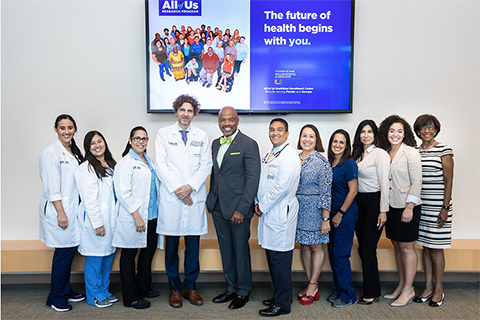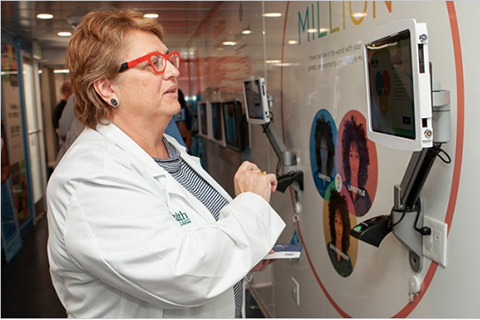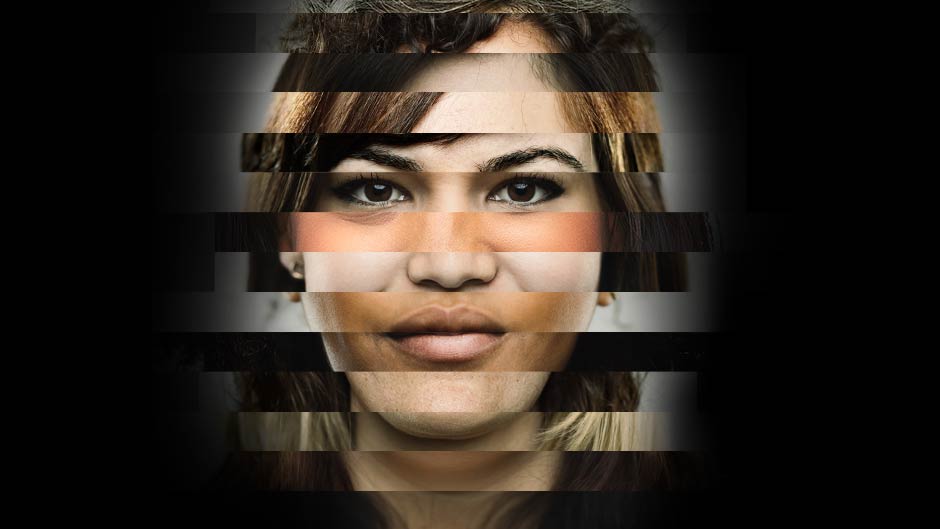A year after the National Institutes of Health (NIH) launched its 10-year All of Us Research Program, a regional team led by University of Miami Miller School of Medicine faculty has achieved remarkable success in recruiting participants who are under-represented in medical research, including individuals from black and Latino ancestry.
“Today’s health care is not tailored to our individual differences,” said Dr. Henri R. Ford, dean and chief academic officer of the Miller School. “It’s time we changed that. For personalized care to become a reality, all our communities need to be represented in medical research. I’m proud that the Miller School and UHealth – the University of Miami Health System are partners in this initiative.”
All of Us is the largest and most inclusive study ever undertaken by the National Institutes of Health. By asking one million or more volunteers across the nation to share different types of health and lifestyle information, the initiative aims to speed up health research and medical breakthroughs to improve health outcomes and deliver precision and personalized medicine to patients.
With its expertise in genetics and genomics and its location in one of the most ethnically diverse counties in the nation, the Miller School is the lead partner in the study’s SouthEast Enrollment Center (SEEC), which includes the University of Florida and Georgia’s Emory University and Morehouse College of Medicine. Nine other academic consortia across the nation also are enrolling participants that reflect the geographic, ethnic, racial, socioeconomic, age, and gender diversity of the U.S.

“Our team has made great strides in our first year, and we are well on our way toward achieving our enrollment targets,” said Dr. Stephan Züchner, the SEEC’s lead principal investigator (PI), who chairs UM’s Dr. John T. Macdonald Foundation Department of Human Genetics and co-directs the John P. Hussman Institute for Human Genomics.
Early enrollment success
The Southeast region has enrolled more than 14,000 participants in Florida and Georgia, including 7,000 from Miami-Dade, said Dr. Olveen Carrasquillo, professor of public health sciences, chief of the Division of General Internal Medicine, and a study PI who serves as the SEEC’s participant engagement lead.
“More than 70 percent of our study participants have diverse minority backgrounds, and in Miami-Dade that percentage is even higher — about 87 percent,” he added.
Carrasquillo said the UM team’s initial recruiting efforts have focused on patients and family members at UHealth hospitals, ambulatory care centers, primary care clinics, and other facilities where electronic health records (EHRs) are available. Recruitment efforts will continue to grow in the coming years.
Noting that the All of Us regional team includes more than 120 faculty and staff, Züchner said, “This is an outstanding team effort. It takes time to build a collaborative research organization that can recruit thousands of participants. This is a marathon, not a sprint.”
A new baseline
“The All of Us study will create a baseline to put precision medicine into practice,” said co-PI Margaret Pericak-Vance, a global leader in the genetics of common diseases who is the Dr. John T. Macdonald Foundation Professor of Human Genetics, director of the Hussman Institute, and executive vice chair of the Department of Human Genetics. “Genetics and genomics will drive medicine in the future, and this is the first step toward bringing them into the standard of care.”

Along with genetic information, the All of Us study is collecting vital data about individual lifestyles, and environments that can affect how individual genes are expressed, and impact overall health outcomes.
“This is one of the most exciting aspects of the study,” Carrasquillo said. “Participants will be contributing to many future studies to improve the health of everyone.”
Rosario Isasi, research assistant professor of human genetics, said obtaining gene samples from participants will help identify causes of disease and potential new therapies.
“There is also the issue of justice,” added Isasi, a lawyer and co-investigator supporting ethics/regulatory aspects of the study and co-chair of the All of Us Resource Access Board. “We all contribute to biomedical research through our taxes, and we all are part of humanity. This study will help fill current research gaps and provide more equal benefits to diverse populations. It will fix the shortcomings of the past and support meaningful discoveries for everyone within a robust ethical framework.”
Lessons for the future
The success of the All of Us recruitment campaign may also provide valuable lessons for future clinical trials, according to Jacob L. McCauley, associate professor of human genetics and pathology, and director of the Hussman Institute's Center for Genome Technology.
“We hope to leverage our team’s outreach efforts,” said McCauley, a co-investigator who is leading logistics and other SEEC efforts and serves on the Biospecimen Access Policy Task Force. “For instance, much of our success has been our ability to build face-to-face relationships, explaining our study, answering questions and gaining participant trust.”
Along with recruiting participants, the All of Us team is reaching out to community physicians to educate them about the study, Pericak-Vance said.
“Genetics will be an increasingly important aspect of clinical care,” she said, noting that the Miller School offers its medical students a master’s degree in genomic medicine, as well as a medical genetics residency program.
Looking ahead, Ford said he looks forward to the findings from the 10-year study, which will help clinicians create individual prevention, treatment, and care plans for patients of all races and ethnic groups. “I invite you to participate in the All of Us study, which will help shape the future of health care,” he added.
To enroll
Anyone interested in signing up for All of Us study can create an account at joinallofus.org and fill out the necessary enrollment and consent forms. The online process, which takes about 30 minutes, includes watching info videos, answering several health surveys, and, for those who agree, sharing electronic medical records. Participants who complete those steps will be invited later to a University of Miami site to provide their physical measurements, including height, weight and blood pressure, and samples of their blood and urine. The data, which will be encrypted and subject to robust privacy safeguards, will be used to build the national All of Us database. The program will contact participants about new surveys and additional ways to share information over time.
The SouthEast Enrollment Center is supported under NIH funding award #1OT2OD025285. “All of Us” is a registered service mark of the U.S. Department of Health and Human Services.

